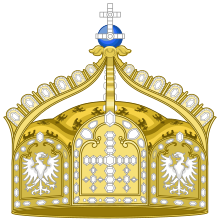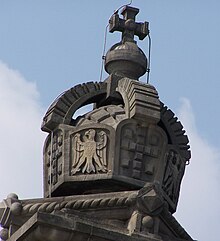German State Crown
This article relies largely or entirely on a single source. (September 2023) |



In 1871 a design and a model for a new state crown (German: Staatskrone) were created to reflect the new German Empire.[1] The model was based upon the Crown of the Holy Roman Empire and was kept in the Hohenzollern museum at Schloss Monbijou in Berlin, until it disappeared during World War II. It has never re-surfaced. No final crown was ever made. However, the design was used as a heraldic device for the German Kaisers from 1871 until Kaiser Wilhelm's abdication in 1918. The crown was most used as an heraldic symbol, in the German coat of arms and the Emperor's personal standard.
A drawing of the crown is used as an emblem by a German monarchist group called "Tradition und Leben" ("tradition and life").
Crowns for the Empress and Crown Prince were also designed and wooden models made.
References
[edit]- ^ "Mehr Schein als Sein : Nach der deutschen Reichseinigung von 1871 gab es die Kaiserkrone nur als Entwurf und Modell". archive.wikiwix.com (in German). Retrieved 2023-09-14.
![]() Media related to German State Crown at Wikimedia Commons
Media related to German State Crown at Wikimedia Commons
